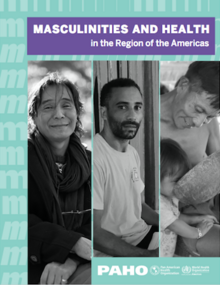Masculinities and Health in the Region of the Americas describes how men’s health and well-being is a product of multiple factors, in particular the construction of masculinity. The report details how the various masculinities impact men’s health as well as the health of women, adolescents, and children. It also documents how social determinants such as gender, ethnicity, age, and education exacerbate the inequities and barriers to health that certain groups face. Based on an exhaustive analysis of the available literature, surveys, and expert opinions, the report reveals the complexity of the issue of masculinities and health, and the failure to address this issue in the policies and programs of the Region’s countries. It would be unthinkable to analyze men’s health from the gender perspective without feminism as a forerunner. It is time to mobilize the political will and the resources necessary to adopt an approach that encompasses both men’s and women’s needs. To help achieve this objective, the report concludes with nine innovative recommendations aimed at helping to integrate the relational gender perspective in a multisectoral strategy of coordinated policies to improve the health of men and boys.
|

